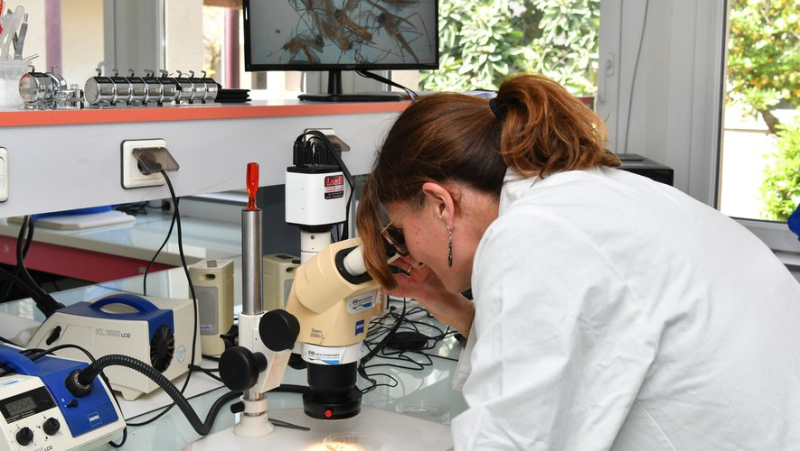EID-Med, effective against the marsh mosquito but “can do better” against the tiger mosquito

L’EID-Med dispose d’un laboratoire efficace de lutte contre tous les moustiques. Midi Libre – JEAN MICHEL MART
La chambre régionale des comptes Occitanie (CRC) a examiné la gestion de l’Entente interdépartementale pour la démoustication du littoral méditerranéen, l’EID-Med. Un rapport de 56 pages qui demande à mettre en cohérence la gestion de lutte contre le moustique des marais comme celui du moustique tigre.
Who ultimately worries about knowing which mosquito bit him ? Is it the one from the marshes, during the aperitif, settled for millennia in our wetlands ? Or by this new kid, smaller and more annoying, the tiger mosquito, which arrived in our region about twenty years ago ? For the general public, EID-Med , the Interdepartmental Agreement for Mediterranean Mosquito Control takes care of getting rid of these pests. Without distinction…
But it’s not as simple in detail. This is confirmed by the report of the Occitanie regional chamber of accounts which examined the management of this major institution. Created in 1959 when General de Gaulle wanted to create seaside resorts on the Languedoc coast on these former marshes which were then inaccessible.
A historic mission disrupted by the invasion of the tiger mosquito
65 years later, the mission of EID-Med remains essential for nearly 2 million inhabitants, for the tourism development of the region on the five departments of the Mediterranean coast (Pyrénées-Orientales, Aude, Hérault, Gard, Bouches-du-Rhône) which make up its mixed union, to which should be added the membership of the Occitanie region.< /p>
The accounts are good, assures the CRC Occitanie in the use of 10 M€ of annual public money. "But the historic missions of EID-Med are disrupted by the invasion of the tiger mosquito, arriving from southeast Asia’ quot;, notes one of the CRC magistrates. "It’is very good on the marsh mosquito, summarizes President Valérie Renet, on the tiger mosquito, it’is the mention can do better".
The report points out the difference in treatment: by plane by spraying a biocide on the larvae to fight against the marsh mosquito. A technique which "cannot be applied to the management of the tiger mosquito", a very invasive species which likes to live in town. And which proliferates thanks to very small collections of water.
"Do not weaken your core business"
Thus the EID is essentially content to provide information to the general public. And intervenes in a curative manner within the framework of vector control. When a case of infection with a virus, transmitted by the tiger mosquito, is detected. A mission entrusted to the Regional Health Agencies (ARS), a sort of state health prefecture. Which are subject to the rules of public procurement, in a market that has become competitive. And as no one is a prophet in his country, EID-Med does not have the vector control market in Occitania and does in Paca.
Or "the populations do not understand that one type of mosquito is treated on a regional scale and another by the State’ ;quot;, notes expert Didier Fontenille. Which ensures that EID-Med is able "to be interested in all mosquitoes, without distinction".
The CRC regrets that the EID "mobilizes financial resources" to the fight against the tiger while the money used is "statutoryly allocated to its historic and essential mission of coastal mosquito control& quot;. And encourages the interdepartmental agreement to redefine “the conditions for the exercise of this mission, its territory of application and the financial means that it will be able to dedicate to it without weakening the heart of its profession".
Reconsider the strategy of the EID-Med
D’as much as the institution has a very efficient laboratory which allows us to know more about all the pests :"Despite ongoing research and experimentation efforts, no proven collective solution currently exists to effectively mitigate the nuisance caused by the tiger mosquito", regrets Christophe Morgo, the president of the EID in his response to the CRC.
So should it focus on its historic mission or use its expertise to also fight against the tiger mosquito ? Christophe Morgo says he is ready to & quot;reconsider its strategies, explore new approaches and find its right place in supporting these developments." In these times, total coherence should not be not harm…
A CRC and university agreement to provide expertise
The CRC Occitanie, a legal and financial institution, and the University of Montpellier signed a partnership agreement this Wednesday, July 3, to enable experts to be called upon in the context of financial jurisdiction examinations. The subject of mosquito control in Occitanie was the subject of a speech by Didier Fontenille, an international expert, member of Covars and Emeritus Research Director at the IRD (Research Institute for Development). “We will be able to bring expertise on many subjects such as transport or carbon energies”, stressed the president of the university, Philippe Aug”. Val&érie Renet, president of the CRC Occitanie, stressed that “these skills will be increasingly necessary”, to better control the use of public money.
I subscribe to read the rest



